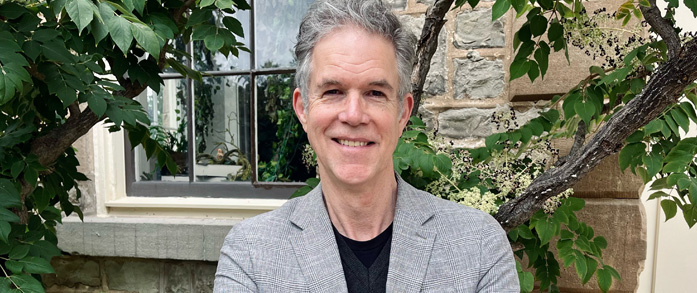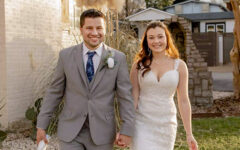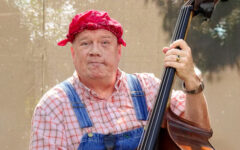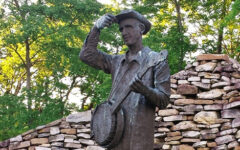
As mentioned last week, our recent discussion of epitaphs leads us right to a topic we’ve never tackled here before: the afterlife. In this divided and argumentative time, this can devolve quickly into theological debates about “soul sleep,” or what Paul really meant by “the air” (1 Thessalonians 4:17), which is why I’d shied away from it in the past, but I thought I’d go ahead and risk it anyway.
This is a good time to remind you that this is a humor or satire column, so try to read this in the spirit in which it was intended: a completely foolish one.
We all have different beliefs about what happens when you leave this earthly existence. Nowadays we even have different beliefs about what the earth itself is. Is it a sphere or were our teachers lying to us all this time and it’s more like a very very long football field or parking lot (with no good spaces near the door)? For now, let’s suspend any quibbling about the validity of some of the details, and let’s examine what the afterlife—specifically the bluegrass afterlife—might look like, by following the fate of two very different band leaders:
Bandleader A lived an exemplary life fronting the band Raked Grass for over 40 years. He paid his band members more than he paid himself, he was honest in all his business dealings, even declaring all money earned from CDs and other merchandise on his taxes ($450 or so per year). He would play longer when requested to or cut a set to as little as two songs, as needed. He performed for numerous charitable causes, and brought his music to countries others were afraid to even watch movies about. He was a devoted family man who would always call home when on the road, even before the cell phone, sometimes waiting in line to use the pay phone at Denny’s while awaiting his order of “Moons Over My Hammy.” He made some of the best moonshine within a 100-mile radius but never drank it himself.
Here’s what awaited this admirable ambassador of bluegrass in the hereafter: he followed a bright and welcoming light at the end of a tunnel where the sound of beautiful music could be heard. He reached the other side to find himself at a bluegrass festival in the most beautiful setting he’d ever seen. The stage was nestled in a grove of trees. It was sunny and 73.5 degrees Fahrenheit with a light breeze from the east. There were thousands of contented people sitting on a hillside in luxuriously comfortable lawn chairs. Ralph Stanley, Jack Cooke, and Keith Whitley were singing Gloryland a cappella on the stage with Carter Stanley watching from the side of the stage. They had followed a set by Bill Monroe with Lester Flatt and Earl Scruggs in the band. The festival promoter—who appeared to be an angel but with an accent very similar to Carlton Haney’s—approached the newcomer and said, “you’re on next! But of course you’ll want to partake of the gourmet turkey dinner prepared for you backstage. You’ll find bottled wine in the cooler.”
“Next?!” our bandleader exclaimed. “I can’t follow those guys!”
“Oh sure you can,” the angel/promoter reassured him. “The crowd loves everybody here. You’ll get two encores at least.”
“But I also have no band, unless my former fiddle player who passed away in 2015 is here, but that seems very unlikely.”
“Have no fear . . . about anything, really. We’ve arranged that for you. Are you okay with Crowe on banjo?”
“Are you kidding?! J.D. Crowe in my band?”
“Of course. Don’t you know yet where you are? Benny Martin’s available for fiddle. And let’s see,” the angel continued, reading a stone tablet of some kind, “Cousin Jake Tullock will play the bass for you, and we’ve got Jesse McReynolds to play mandolin. Okay with you?”
Our bandleader was speechless.
“Oh by the way,” continued the angel/promoter, “I’ll just give you your check right now. Two million dollars is what I’d discussed with your agent, The Nicest Person in the World. Mind you you’ll have nothing to spend it on here; everything’s free, but I thought it would feel nice to get it.”
He played his set. The sound was perfect. Don Reno sat in for a song. He literally floated to the merch table (made of gold) following the set. Already feeling at home in this new place, he just gave his merchandise away.
A decidedly different scenario awaited Bandleader B:
He was a universally reviled figure in the bluegrass scene. He led the band Lonesome Finances for over 35 years. During that time he paid his band members next to nothing, but always less than he had promised. His personnel changed almost weekly, and would have changed more often except that he used blackmail and intimidation to keep his band members longer than they wanted to stay. In 2019 he had booked a California tour and flew himself out but made his band members drive themselves there from Kentucky in his sister’s 1996 Plymouth Breeze. To avoid trouble with collection agencies and the IRS, he faked his own death, which ended up being six weeks before his actual death.
After passing away, he seemed to arrive almost instantly at a bluegrass festival which was being held on top of a reclaimed strip mine. It was muddy and appeared to have been raining for several days. There was a band he didn’t recognize on stage, playing what sounded like an unusually long version of Wagon Wheel but with different lyrics that included something about “the ranks of woe.” It didn’t matter much because mostly what he heard was ear-piercing feedback.
A shifty-looking character in a shiny but mud-splattered suit approached him hurriedly:
“Where have you been?! You were supposed to be on stage ten minutes ago! Come on, your band is all waiting for you.”
“My band?” inquired Bandleader B. “What band would that be?”
“Oh just some people we assembled for you. We’ve got Crowe on banjo, for one thing.”
“Whoa! J.D. Crowe? Playing with me?!”
“No no, Merv Crowe,” replied the promoter. “Nice guy. Part time picker. Runs a used car dealership nearby. Has some timing issues but he should be fine. We also have Krauss on fiddle, if that’s okay.”
At this point our bandleader knew not to even ask; he’d already heard this joke.
“Hey, sorry I can’t pay you the $150 I promised. The rain has kept the crowd down and I just don’t have it. That band on stage that’s running 20 minutes over just took all the cash I had. If you like, I’ve got some gift certificates for O’Malley’s pizza in town. Somebody was shot in there this week, but I think the pizza’s pretty good, really. By the way, the stage manager, Hannibal, just told me we need to cut you to 15 minutes. That okay?”
“Actually, in this case it’s more than okay.”
“You’re on again at 8:00 a.m. tomorrow morning with a completely different band. You can do your full set then. By the way, you can set your CDs and stuff at a table four miles from here that no one can see. People don’t buy much here, but if they do we take the standard 20% cut. I’m sure you understand.”
“Does the festival end tomorrow?” asked the bandleader, hopefully.
“Oh it never ends.”







